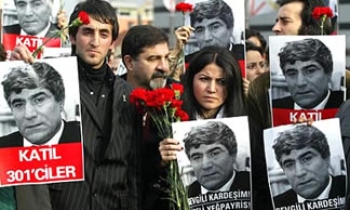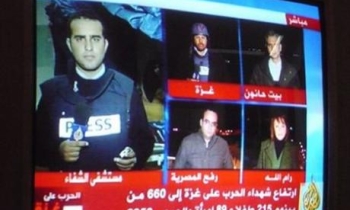History will tell it as a story of cartoons, a case of satire aimed at Muslims and the Prophet Mohammad. Cartoons so offensive that, four months after their publication in a Danish newspaper, they sparked off enraged protests around the Islamic world unleashing a fury of violence against the blasphemous, godless and desecrating West. Calling up the phantoms of religious wars and racial conflicts and striking the collective imagination with the vision of a fanaticism that cannot wait to explode. What should the West do in the face of such explicit demonstrations of fundamentalism? What means can it use to establish dialogue? What price is it likely to pay, and which of its values must it be ready to give up? L'Espresso speaks to Emma Bonino, one of the leaders of the Rosa nel Pugno group made up of Radicals and Socialists. Committed from the beginning of her political career to the battle for human and civil rights, she currently lives in Cairo where she is learning Arabic and is thus one of the few European politician-experts on the Arab world.
Q: What lies behind this explosion of violence?
A: There are people who may never have even seen the cartoons but who felt genuinely offended. Partly because in some countries, where people are unaccustomed to the freedom of the press, newspapers are considered the voice of governments. But my impression is that it was just a pretext. There is clear manipulation here, the unleashing of a disproportionate reaction at a time marked by two events: The approach of the anniversary of the assassination of [former Lebanese Prime Minister Rafik] Hariri in Beirut, and the resultant trial, and the discussion in the [United Nations] Security Council of the Iran question. The two common threads are Syria and Iran, countries in difficulty; both from an international point of view and in their own world.
Q: Should the West review its concept of freedom of the press? Can we continue to
publish satire about Muslims and Mohammad?
A: I wouldn't continue publishing these cartoons just simply out of provocation. But I wouldn't for a minute change our behavior, because censorship does not appease hatred. We have seen many times over the course of history that compromising with evil does not work. We must not bow to the demands of violent militants.
Q: You are one of the few [European] politicians who know the Arab world and the way it works. What can the West do to establish real dialogue?
A: On Europe's part there has been a complete lack of political initiative. Even in the face of clear signals. In December, for example, Saudi Arabia - the government, that is, and not local consumer associations - decided to boycott Danish products. Yet there was no official reaction. No one went to Riyadh or offered to speak to Al-Jazeera or Al-Arabiyya to explain that for us cartoons and newspapers are cartoons and newspapers, and that governments and peoples
are something different. And that the boycott was therefore unacceptable. This is an example of the inability to read what is happening in the Arab world, of a Europe that favors stability at all costs, especially if someone else is paying the costs, and if oil-producing countries are involved. A Europe that expresses condemnation, but only half-heartedly.
Q: Perhaps because it is afraid to take positions that may unleash reactions that threaten world security.
A: If this is what it fears, the result is absence. Take the recent Egyptian elections. Won by [sitting President Hosni] Mubarak, of course. Only 20 percent of the population voted, and 4 percent chose the Muslim Brotherhood. The election campaign was marked by violence and fraud, the most secular and liberal forces were kept out. All this did not bring any reaction. No governments or political forces got in touch with the secular Muslims, who thus felt abandoned and helpless. The same thing happened in Iran. When 200 democratic candidates were excluded from the election, Europe didn't even raise an eyebrow.
Q: So the first line of contact should be with the moderates?
A: This might lead somewhere. We must be rigorous in our dealings with regimes. But we must also give concrete support to the secular democrats and the Arab bourgeoisie, who aspire for a better, freer life, but have no one to look to, neither at home, of course, nor abroad. The first to take this path was [German Chancellor] Angela Merkel. She visited [Russian President Vladimir] Putin, and received Russian dissidents at the German embassy, not just unofficially, but in an official meeting. This is one path. The other is to strengthen our alliance with countries which are moving toward democracy.
Q: Morocco, the other face of Islam...
A: And Turkey, too. Europe cannot afford to have negotiations with Turkey lasting 10 years! And now there's the hot potato represented by Hamas. In my opinion, we should make it very clear that we are ready to give suitable economic backing in order to help bring in reforms and improve the life of the Palestinian people, not to foment fundamentalism. We must make an effort to understand that the conflict is not religious, but political. It is between open societies and closed, theocratic, dictatorial and authoritarian societies. In the West governments hardly ever last decades. Many years ago, before a conference I asked an Arab friend for advice on how to represent the Arab world. "Simple," he replied. "All you have to say is that it is made up of 22 countries where there are no former presidents. They either die of old age, still in power, or we get tired of them and kill them. We have no other alternative.
Q: In the face of these regimes, dialogue and sup-port may be effective tools in the long run. But can they really counter the strength of fundamentalism?
A: It depends on the channels we choose. The tools used by Western governments are terribly obsolete: meetings, delegations, the occasional exchange. But there is no attempt to invent new channels of communication. For years I have been calling for the creation of an Arab television channel run by moderate Arabs who can speak to their people, maybe funded by the European Union. So far I have had no success.
Q: The great specter of fundamentalism is freedom and equality. These values are also integral to women's rights.
A: Women are an important key to open the door to democracy. They can be a revolutionary force, but without recourse to violence. I have strong links with this world, where once again there are two strands: women who are believers but are secular in their approach to the political sphere, and women who call for an innovative review of the Koran. But ultimately their aim is the same: a recognized model of accepted rights. In many countries, women are actually seen as more dangerous than extremists or fanatics, who can easily be bought and corrupted.
Q: Some people believe that the differences between Islam and the West areinsurmountable.
A: This is not true. The problem is that we do not know them. They know us better. Their ruling classes have access to the BBC and CNN, many of them speak three languages. The extremists are a minority, though an extremely visible minority because violence makes headlines. There are millions of people who try to live normal lives and aspire for a different world. But they are not news. At the recent Istanbul conference on "Equal Opportunities and Political participation of Women in the Middle East and North Africa," which was extremely important, neither the Western press nor the Arab press were present. Only bloodshed makes the front pages. But Arab democrats place their hope in us, even though they are left to fend for themselves.
Q: Will Western civilization have to give up certain values in order to live side by side with Islam?
A: No. The problem is not reciprocal rejection or intolerance. It is the promotion of freedom, a universal value. It may not be important for the regimes or the extremists, but it is for the millions and millions of Muslims, Hindus, Buddhists, Jews, atheists or Copts who populate the earth. You only have to look at the queues of Egyptians outside consulates waiting to apply for visas for America, Canada and Europe to understand that hatred of the West is limited to a tiny minority. In the face of the oppression of so many peoples I sometimes wonder - when we in the West talk about peace - whether what we really mean is our own peace. As my Syrian friends say: "Peace, peace ... in reality you are only thinking of your own peace, we don't know what it means. Every day we experience a terrible, insidious war, the sort of war that only authoritarian regimes are capable of."









